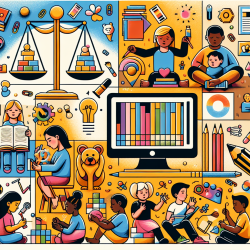Introduction
Brazil's early childhood education (ECE) policies are among the most progressive globally, emphasizing children's rights and universal access. However, despite these advancements, significant disparities remain, particularly in access and quality across different regions and socioeconomic groups. This blog explores key findings from the research article "Early Childhood Education in Brazil: Child Rights to ECE in Context of Great Disparities" and offers insights for practitioners aiming to enhance their skills and improve outcomes for children.
Understanding the Brazilian Context
Brazil's ECE system is characterized by its commitment to children's rights, as enshrined in the Federal Constitution of 1988 and further reinforced by the 2016 Legal Framework for Early Childhood. These policies mandate universal access to preschool education for children aged four to six. However, the implementation of these rights is challenged by Brazil's highly decentralized political structure and significant socioeconomic, racial/ethnic, and geographic disparities.
Key Findings and Implications for Practitioners
- Disparities in Access: Despite high overall enrollment rates, access to quality ECE varies significantly across regions. Practitioners should focus on identifying and addressing local barriers to access, particularly in underserved areas.
- Impact of Socioeconomic Status: Children from poorer families and non-white backgrounds face greater challenges in accessing quality ECE. Practitioners can advocate for targeted interventions and resources to support these vulnerable groups.
- Quality of Education: The quality of ECE varies widely, with public institutions often lagging behind private ones. Practitioners should strive to implement best practices and continuous improvement strategies to enhance educational quality.
Encouraging Further Research and Collaboration
Practitioners are encouraged to engage in further research and collaboration to better understand the complexities of Brazil's ECE system. By participating in studies and sharing insights, practitioners can contribute to the development of more effective policies and practices that address disparities and promote equitable access to quality education for all children.
Conclusion
Brazil's progressive ECE policies provide a strong foundation for promoting children's rights and access to education. However, significant challenges remain in ensuring equitable access and quality across the country. Practitioners play a crucial role in addressing these challenges by implementing data-driven strategies and advocating for systemic improvements. By doing so, they can help create a more inclusive and effective ECE system that benefits all children.
To read the original research paper, please follow this link: Early Childhood Education in Brazil: Child Rights to ECE in Context of Great Disparities.










